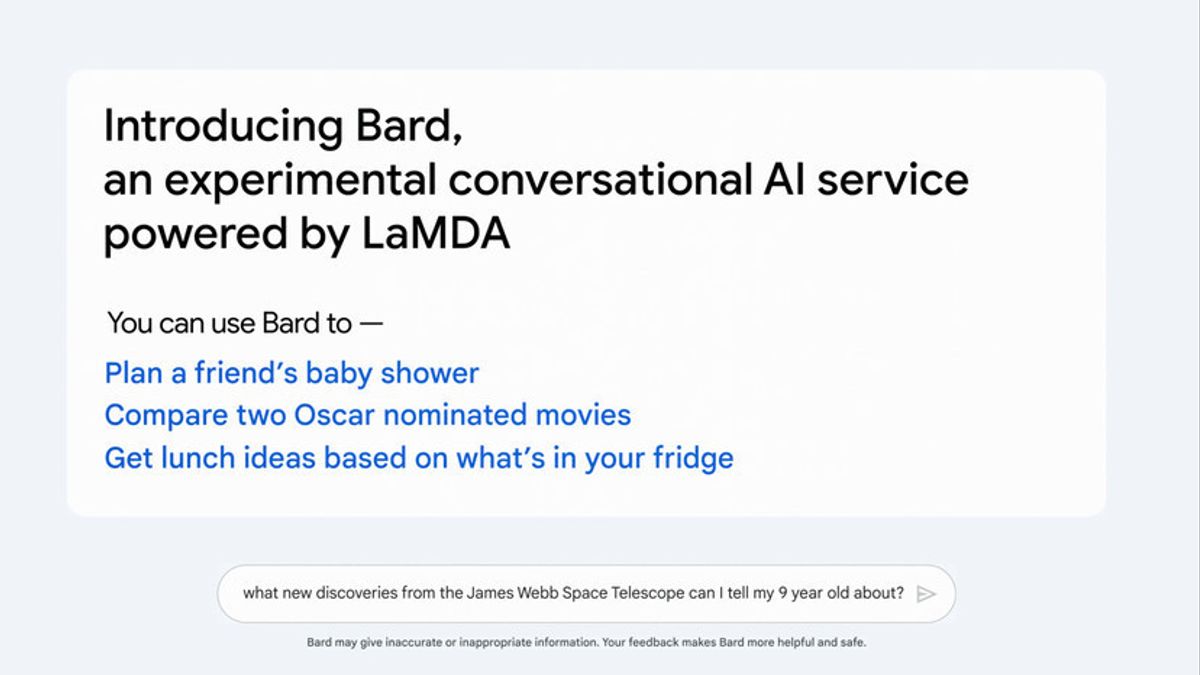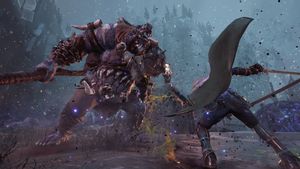JAKARTA - After being tested internally, Google finally launched a chatbot powered by Artificial Intelligence (AI) ChatGPT competitor, Bard.
Alphabet CEO Sundar Pichai announced the project in a blog post, describing Bard as an experimental conversational AI service that would answer user questions and take part in conversations.
Pichai added that Bard builds on Google's existing big language model, LaMDA, which he claims is also so human-like when responding to questions that he believes it's alive.
LaMDA is currently only available via the AI Test Kitchen app. However this version is very limited, only being able to return the text associated with some queries.
“The bard can be both an outlet for creativity, and a launching pad for curiosity, helping you explain new discoveries from NASA's James Webb Space Telescope to a 9-year-old,” said Pichai.
"Or learn more about the best strikers in football right now, and then get practice to build your skills."
Bard is said to be Pichai, designed to answer questions and find information. They used what existed on the Internet as a huge database of knowledge, suggesting Bard might be able to answer questions about current events, something that OpenAI's ChatGPT strives for.
However, there are concerns that Bard's Internet-based data capture may also include offensive and disinformation material.
"Bard seeks to combine the breadth of the world's knowledge with the power, intelligence and creativity of our big language model. (He wants Google's AI services) to be bold and responsible," Pichai said.
Unfortunately, he didn't explain how Bard would be prevented from sharing harmful content. The platform will initially run on a light version of Lambda, which requires less power so more people can use it at once.
"(Google will combine) external feedback with our own internal testing to ensure Bard's responses meet high standards of quality, security, and grounding in real-world information," explained Pichai.
The platform will initially run on a light version of LaMDA, which requires less power so more people can use it at once.
AI integration into Google Search
Meanwhile, Google also emphasizes how they build AI into many of its products, including its search engine.
Over the past few years, Google has used AI to summarize more search results, displaying information from sites rather than allowing users to click and explore themselves. From what Pichai revealed, it looks like the feature will become more prominent in the future.
"AI can help in these moments, synthesizing insights for questions for which there are no right answers," said Pichai.
"Soon you'll see AI-powered features in Search that distill complex information and multiple perspectives into an easy-to-digest format, so you can quickly understand the big picture and learn more from the web. These new AI features will roll out to Google Search soon," he added.
For your information, Google's announcement follows widespread speculation that Microsoft will bring ChatGPT to search engine Bing, by recently re-purposing its multi-billion dollar investment in OpenAI.
ChatGPT can answer questions and make requests in text form, based on information from the Internet as of 2021. This chatbot can generate speeches, songs, marketing copy, news articles, and student essays.
Currently, the tool is free, but the startup has plans to launch a paid subscription tier, aka ChatGPT. This was quoted from The Verge, Tuesday, February 7.
The English, Chinese, Japanese, Arabic, and French versions are automatically generated by the AI. So there may still be inaccuracies in translating, please always see Indonesian as our main language. (system supported by DigitalSiber.id)













